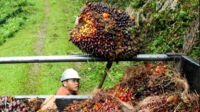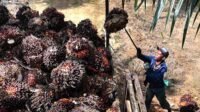PALMOILMAGAZINE, JAKARTA — Stricter sustainability requirements in global supply chains could sideline independent palm oil smallholders from accessing more profitable markets. A recent study on certified palm oil mills in Indonesia revealed that despite contributing significantly to regional production, independent farmers remain largely excluded from sustainable supply chains.
The research found that smallholders account for about one-third of palm oil production in the study area. Yet, their supply represents only 7% of certified mills’ intake. In contrast, farmers tied to partnerships or exclusive contracts dominate the flow of raw materials to these mills.
“We found no evidence of active exclusion, such as mills directly rejecting independent farmers’ harvest. What occurs instead is passive exclusion, where most certified mills simply never purchase from them,” stated the report Uneven participation of independent and contract smallholders in certified palm oil mill markets in Indonesia, authored by Andini Desita Ekaputri, David L. A. Gaveau, Robert Heilmayr, and Kimberly M. Carlson, as cited by Palmoilmagazine.com from Nature.com on Thursday (September 18, 2025).
Also Read: 5th IPOSC Becomes Milestone for Strengthening Smallholder Unity and Sustainability
Data showed that only 36% of certified mills had ever sourced fresh fruit bunches (FFB) from independent farmers. Moreover, smallholder plots were less common near certified mills—about 29–38% of surrounding land, compared to 41–42% near non-certified mills. This reflects structural barriers limiting smallholders’ access.
At the same time, sustainable palm oil has become a global market requirement. The European Union, for example, through its EU Deforestation Regulation (EUDR), requires palm oil products to be deforestation-free and fully traceable. Certification schemes like RSPO and ISPO are seen as vital tools for maintaining Indonesia’s competitiveness.
However, without tangible support, smallholders struggle to meet these standards. Many face challenges in land legality, farming capacity, and certification costs. Meanwhile, downstream buyers often prefer large plantations or plasma smallholders, seen as more reliable and less risky suppliers.
“Smallholders are the backbone of the global food system, especially in tropical regions. They contribute over 70% of the world’s calorie supply. Excluding them from sustainable supply chains undermines the broader goal of balancing environmental protection with improved livelihoods,” the study noted.
The researchers stressed the need for more inclusive supply chain governance. Certification schemes and zero-deforestation commitments should go beyond technical requirements by actively encouraging supply chain actors to integrate smallholders. This could involve training programs, legal land facilitation, and incentives for mills to source from independent farmers.
Without such measures, the shift toward sustainability risks deepening inequality—allowing large companies to secure premium markets while smallholders are left behind. Ensuring smallholder inclusion, they argue, is not just about social justice, but also key to the long-term resilience of Indonesia’s palm oil industry. (P2)





































